七夕节的习俗英语
- 格式:docx
- 大小:28.22 KB
- 文档页数:6
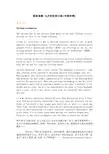
英语故事:七夕的民间习俗(中英对照)【英文】Chinese ceremoniesThe seventh day of the seventh lunar month is the only Chinese festival devoted to love in the Lunar calendar.Unlike St. Valentine''s Day in Western countries there is not so much emphasis on giving chocolates, flowers and kisses. Instead, Chinese girls prepare fruits, melons and incense(熏香) as offerings to Zhi Nu, the weaving maiden, praying to acquire high skills in needlecraft(裁缝), as well as hoping to find satisfactory husbands.In the evening, people sit outdoors to observe the stars. Chinese grannies would say that, if you stand under a grapevine, you can probably overhear what Zhi Nu and Niu Lang are talking about.Chinese Valentine's Day is also called "The Daughter's Festival". Long ago, Chinese girls aspired to becoming skilled craftswomen like the Weaving Maid. This skill was considered essential to their future as wives and mothers. On that night, unmarried girls prayed to the Weaving Maid star for the special gift. When the star Vega was high up in the sky, girls performed a small test by placing a needle on the water's surface: If the needle did not sink, the girl was considered to be ready to find a husband. Once a year, on this day, girls could wish for anything their hearts desired.In some Chinese provinces, people believe that decorating an ox's horns with flowers on Chinese Valentine's Day will ward off disaster. On the night of Valentine's Day, women wash their hair to give it a fresh and shiny look; children wash their faces the next morning using the overnight water in their backyards for a more naturally beautiful appearance; and girls throw five-colored ropes made during the Chinese Dragon Boat Festival on the roofs so magpies can use them to build the bridge.种生求子:旧时习俗,在七夕前几天,先在小木板上敷一层土,播下粟米的种子,让它生出绿油油的嫩苗,再摆一些小茅屋、花木在上面,做成田舍人家小村落的模样……拜织女:"拜织女"纯是少女、少妇们的事。

【关键字】活动、英语、传统、地方、密切、举行、方式、特色、化解英语故事:七夕的民间习俗(中英对照)【英文】Chinese ceremoniesThe seventh day of the seventh lunar month is the only Chinese festival devoted to love in the Lunar calendar.Unlike St. Valentine''s Day in Western countries there is not so much emphasis on giving chocolates, flowers and kisses. Instead, Chinese girls prepare fruits, melons and incense(熏香) as offerings to Zhi Nu, the weaving maiden, praying to acquire high skills in needlecraft(裁缝), as well as hoping to find satisfactory husbands.In the evening, people sit outdoors to observe the stars. Chinese grannies would say that, if you stand under a grapevine, you can probably overhear what Zhi Nu and Niu Lang are talking about.Chinese Valentine's Day is also called "The Daughter's Festival". Long ago, Chinese girls aspired to becoming skilled craftswomen like the Weaving Maid. This skill was considered essential to their future as wives and mothers. On that night, unmarried girls prayed to the Weaving Maid star for the special gift. When the star Vega was high up in the sky, girls performed a small test by placing a needle on the water's surface: If the needle did not sink, the girl was considered to be ready to find a husband. Once a year, on this day, girls could wish for anything their hearts desired.In some Chinese provinces, people believe that decorating an ox's horns with flowers on Chinese Valentine's Day will ward off disaster. On the night of Valentine's Day, women wash their hair to give it a fresh and shiny look; children wash their faces the next morning using the overnight water in their backyards for a more naturally beautiful appearance; and girls throw five-colored ropes made during the Chinese Dragon Boat Festival on the roofs so magpies can use them to build the bridge.种生求子:旧时习俗,在七夕前几天,先在小木板上敷一层土,播下粟米的种子,让它生出绿油油的嫩苗,再摆一些小茅屋、花木在上面,做成田舍人家小村落的模样……拜织女:"拜织女"纯是少女、少妇们的事。
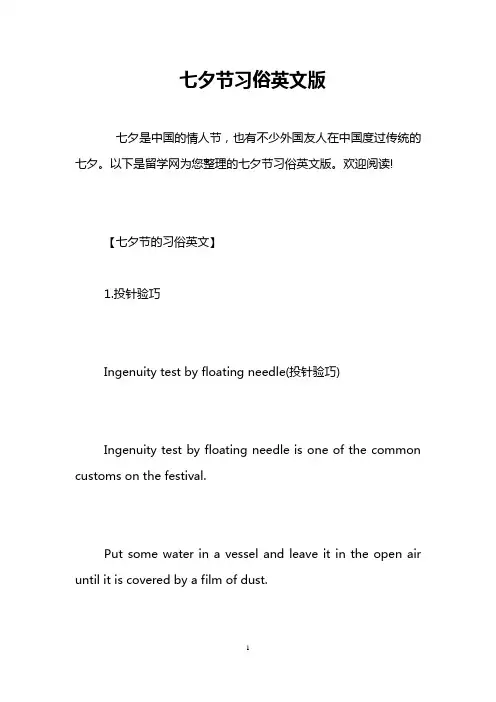
七夕节习俗英文版七夕是中国的情人节,也有不少外国友人在中国度过传统的七夕。
以下是留学网为您整理的七夕节习俗英文版。
欢迎阅读!【七夕节的习俗英文】1.投针验巧Ingenuity test by floating needle(投针验巧)Ingenuity test by floating needle is one of the common customs on the festival.Put some water in a vessel and leave it in the open air until it is covered by a film of dust.Then cast a needle or thin straw on it to see the pattern of the shadow at the bottom, so as to test their ingenuity验巧方法“投针验巧”:先准备一只面盆,放在天井里,倒入“鸳鸯水”,即把白天取的水和夜间取的水混合在一起。
但常常把河水、井水混在一起倒入面盆就算成了,面盆和水要露天过夜,再经第二天即七月初七白天太阳一晒,到中午或下午就可以“验巧”了。
原来面盆里的水,经过半天太阳光照射,表面依稀生成薄膜,于是取引线(即“缝衣针”),轻轻平放在水面上,针不会下沉,水底下,就出现针影,这针影若是笔直的一条,即是“乞巧”失败,若是针影形成各种形状,或弯曲,或一头粗,一头细,或是其他图形,便是“得巧”。
2.穿针乞巧Pleading for Skills by Threading a Needle 穿针乞巧In order to plead for skills, threading a needle(穿针乞巧) is the most long-standing means.It tests the speed of threading a needle under the moon.It is said that the needles used in the contest are the seven-hole needle of the Han Dynasty or the nine-tail needle of the Yuan Dynasty.With more holes than ordinary needles, they are rather hard to handle.验巧方法:七夕之夜,女子手执五色丝线和连续排列的九孔针(或五孔针、七孔针)趁月光对月连续穿针引线,将线快速全部穿过者称为“得巧”。
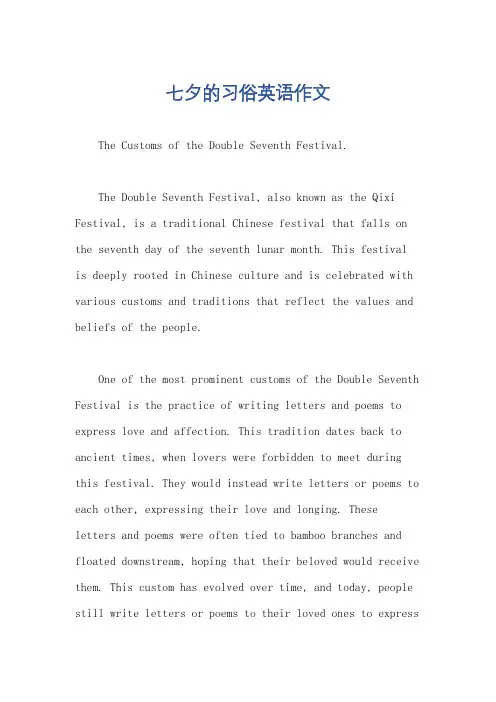
七夕的习俗英语作文The Customs of the Double Seventh Festival.The Double Seventh Festival, also known as the Qixi Festival, is a traditional Chinese festival that falls on the seventh day of the seventh lunar month. This festivalis deeply rooted in Chinese culture and is celebrated with various customs and traditions that reflect the values and beliefs of the people.One of the most prominent customs of the Double Seventh Festival is the practice of writing letters and poems to express love and affection. This tradition dates back to ancient times, when lovers were forbidden to meet during this festival. They would instead write letters or poems to each other, expressing their love and longing. Theseletters and poems were often tied to bamboo branches and floated downstream, hoping that their beloved would receive them. This custom has evolved over time, and today, people still write letters or poems to their loved ones to expresstheir feelings.Another interesting custom of the Double Seventh Festival is the observance of the "magpie bridge". According to legend, on this day, magpies come together to form a bridge across the Milky Way, allowing the Cowherd and Weaver Maid, two lovers separated by the heavens, to meet. People believe that by standing under the magpie bridge, they can祈求 good fortune in love and marriage. To commemorate this legend, people often create paper magpies or decorate their homes with magpie images during this festival.In addition to these customs, the Double Seventh Festival is also marked by various activities such as watching the moon, listening to the legend of the Cowherd and Weaver Maid, and eating special foods. Mooncakes are a popular delicacy during this festival, as they symbolize reunion and completeness. These round pastries are shared among family and friends, symbolizing unity and harmony.The Double Seventh Festival is not only a time forcelebration but also a time for reflection. It reminds us of the importance of love, commitment, and sacrifice in our lives. It is a festival that celebrates the beauty of love and the power of human emotion. Through its customs and traditions, the Double Seventh Festival continues toinspire and influence the lives of people in China and beyond.In conclusion, the Double Seventh Festival is a rich and diverse festival that embodies the spirit of love and unity. Its customs and traditions reflect the values and beliefs of the Chinese people and serve as a reminder of the importance of love and affection in our lives. This festival is not only a celebration of love but also a celebration of human connection and the beauty of emotional expression.。
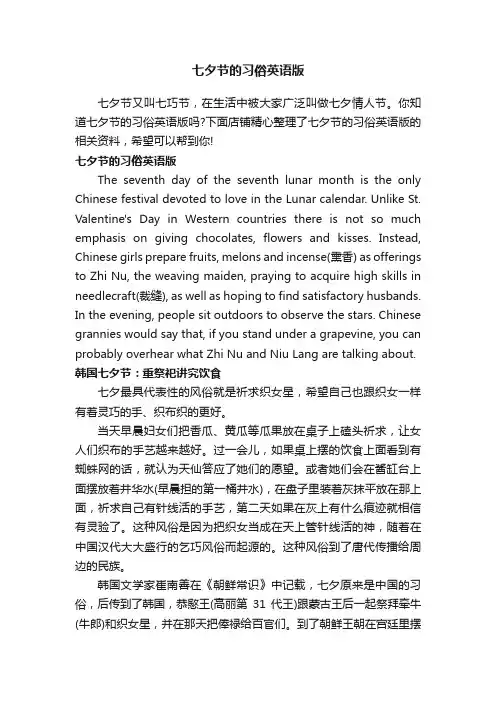
七夕节的习俗英语版七夕节又叫七巧节,在生活中被大家广泛叫做七夕情人节。
你知道七夕节的习俗英语版吗?下面店铺精心整理了七夕节的习俗英语版的相关资料,希望可以帮到你!七夕节的习俗英语版The seventh day of the seventh lunar month is the only Chinese festival devoted to love in the Lunar calendar. Unlike St. Valentine's Day in Western countries there is not so much emphasis on giving chocolates, flowers and kisses. Instead, Chinese girls prepare fruits, melons and incense(熏香) as offerings to Zhi Nu, the weaving maiden, praying to acquire high skills in needlecraft(裁缝), as well as hoping to find satisfactory husbands. In the evening, people sit outdoors to observe the stars. Chinese grannies would say that, if you stand under a grapevine, you can probably overhear what Zhi Nu and Niu Lang are talking about. 韩国七夕节:重祭祀讲究饮食七夕最具代表性的风俗就是祈求织女星,希望自己也跟织女一样有着灵巧的手、织布织的更好。
当天早晨妇女们把香瓜、黄瓜等瓜果放在桌子上磕头祈求,让女人们织布的手艺越来越好。
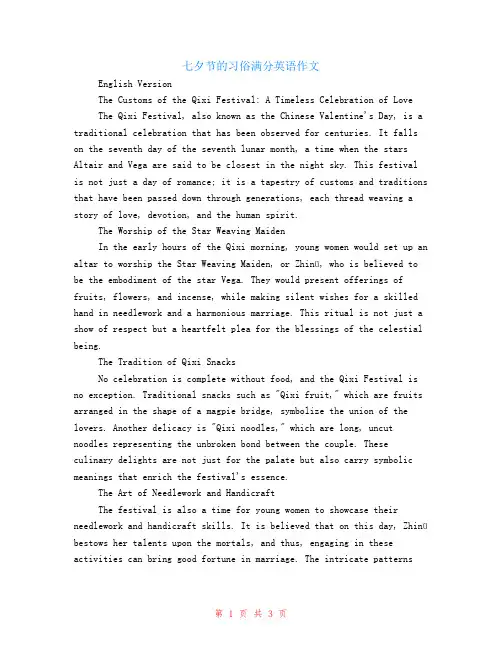
七夕节的习俗满分英语作文English VersionThe Customs of the Qixi Festival: A Timeless Celebration of LoveThe Qixi Festival, also known as the Chinese Valentine's Day, is a traditional celebration that has been observed for centuries. It falls on the seventh day of the seventh lunar month, a time when the stars Altair and Vega are said to be closest in the night sky. This festival is not just a day of romance; it is a tapestry of customs and traditions that have been passed down through generations, each thread weaving a story of love, devotion, and the human spirit.The Worship of the Star Weaving MaidenIn the early hours of the Qixi morning, young women would set up an altar to worship the Star Weaving Maiden, or Zhinü, who is believed to be the embodiment of the star Vega. They would present offerings of fruits, flowers, and incense, while making silent wishes for a skilled hand in needlework and a harmonious marriage. This ritual is not just a show of respect but a heartfelt plea for the blessings of the celestial being.The Tradition of Qixi SnacksNo celebration is complete without food, and the Qixi Festival is no exception. Traditional snacks such as "Qixi fruit," which are fruits arranged in the shape of a magpie bridge, symbolize the union of the lovers. Another delicacy is "Qixi noodles," which are long, uncut noodles representing the unbroken bond between the couple. Theseculinary delights are not just for the palate but also carry symbolic meanings that enrich the festival's essence.The Art of Needlework and HandicraftThe festival is also a time for young women to showcase their needlework and handicraft skills. It is believed that on this day, Zhinü bestows her talents upon the mortals, and thus, engaging in these activities can bring good fortune in marriage. The intricate patternsand delicate stitches are not just a testament to their craft but also a silent prayer for a life filled with love and happiness.The Qixi Night SkyThe Modern TouchWhile the essence of the festival remains, modern touches have been added to keep the celebration relevant. Young couples exchange gifts, often choosing items that symbolize their love, such as jewelry or love letters. Some even take to social media to express their affection, using the festival as an opportunity to share their love story with the world.The Spirit of QixiIn conclusion, the Qixi Festival is a beautiful tapestry of customs and traditions that speak to the heart of humanity. It is a day to celebrate love, to honor the stories of the past, and to look forward to the stories yet to be written. As we partake in the festivities, let us remember the spirit of Qixi and carry it with us, not just for one day, but for all the days to come.Chinese Version七夕节的习俗:一场关于爱情的永恒庆典七夕节,也被称为中国的情人节,是一个被庆祝了数个世纪的传统节日。
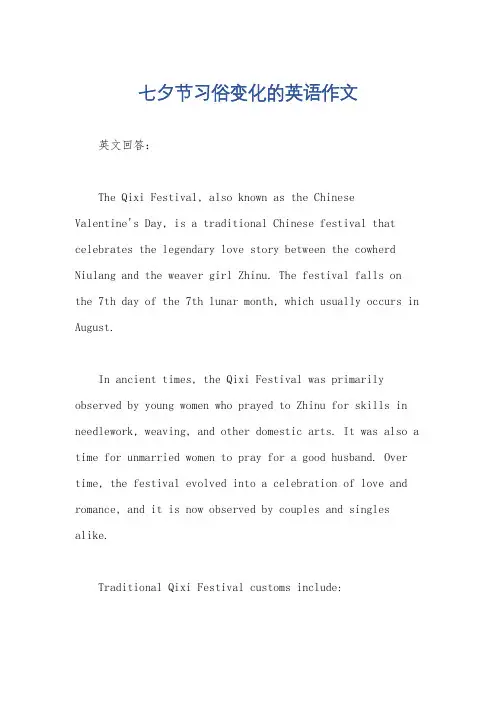
七夕节习俗变化的英语作文英文回答:The Qixi Festival, also known as the ChineseValentine's Day, is a traditional Chinese festival that celebrates the legendary love story between the cowherd Niulang and the weaver girl Zhinu. The festival falls on the 7th day of the 7th lunar month, which usually occurs in August.In ancient times, the Qixi Festival was primarily observed by young women who prayed to Zhinu for skills in needlework, weaving, and other domestic arts. It was also a time for unmarried women to pray for a good husband. Over time, the festival evolved into a celebration of love and romance, and it is now observed by couples and singles alike.Traditional Qixi Festival customs include:Praying to Zhinu: Young women would pray to Zhinu for skills in needlework, weaving, and other domestic arts.They would also pray for a good husband.Eating qiqiao noodles: Qiqiao noodles are a type of long, thin noodle that is traditionally eaten on Qixi Festival. The noodles are said to represent the bridge that Niulang and Zhinu crossed to meet each other.Watching fireworks: Fireworks are a popular way to celebrate Qixi Festival. The fireworks are said torepresent the stars that light up the night sky whenNiulang and Zhinu meet.Giving gifts: Couples and singles often exchange gifts on Qixi Festival. Popular gifts include flowers, chocolates, and jewelry.In recent years, the Qixi Festival has become increasingly commercialized. Many businesses offer Qixi-themed products and promotions. The festival has also become a popular time for couples to go on dates andcelebrate their love.Despite the changes that have occurred over time, the Qixi Festival remains a popular and meaningful traditionfor many Chinese people. It is a time to celebrate love, romance, and the enduring power of tradition.中文回答:七夕节是中国传统节日,也称为中国情人节,纪念牛郎织女的爱情故事。
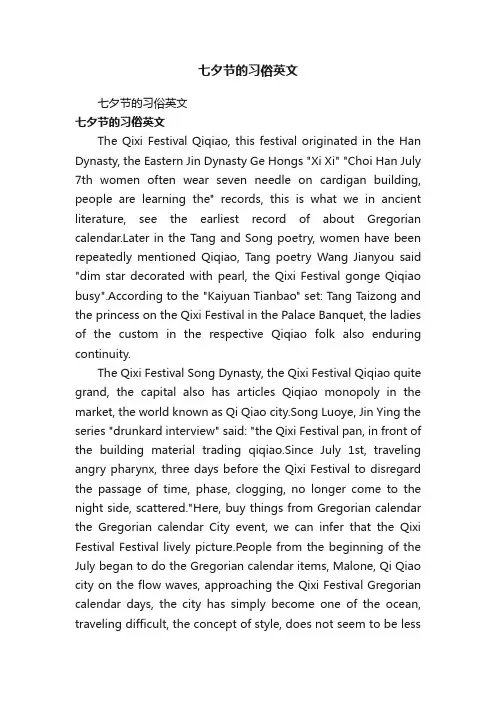
七夕节的习俗英文七夕节的习俗英文七夕节的习俗英文The Qixi Festival Qiqiao, this festival originated in the Han Dynasty, the Eastern Jin Dynasty Ge Hongs "Xi Xi" "Choi Han July 7th women often wear seven needle on cardigan building, people are learning the" records, this is what we in ancient literature, see the earliest record of about Gregorian ter in the Tang and Song poetry, women have been repeatedly mentioned Qiqiao, Tang poetry Wang Jianyou said "dim star decorated with pearl, the Qixi Festival gonge Qiqiao busy".According to the "Kaiyuan Tianbao" set: Tang Taizong and the princess on the Qixi Festival in the Palace Banquet, the ladies of the custom in the respective Qiqiao folk also enduring continuity.The Qixi Festival Song Dynasty, the Qixi Festival Qiqiao quite grand, the capital also has articles Qiqiao monopoly in the market, the world known as Qi Qiao city.Song Luoye, Jin Ying the series "drunkard interview" said: "the Qixi Festival pan, in front of the building material trading qiqiao.Since July 1st, traveling angry pharynx, three days before the Qixi Festival to disregard the passage of time, phase, clogging, no longer come to the night side, scattered."Here, buy things from Gregorian calendar the Gregorian calendar City event, we can infer that the Qixi Festival Festival lively picture.People from the beginning of the July began to do the Gregorian calendar items, Malone, Qi Qiao city on the flow waves, approaching the Qixi Festival Gregorian calendar days, the city has simply become one of the ocean, traveling difficult, the concept of style, does not seem to be lessthan the most grand festival - the Spring Festival, that love is one of the holiday festival most of the ancients.Today, Tanabata is still a romantic tradition of festivals.But many customs activities have weakened or disappeared but the symbol of loyalty love cowherd legend, has always been civil, so it is called "the Qixi Festival is Chinese Valentines day".。
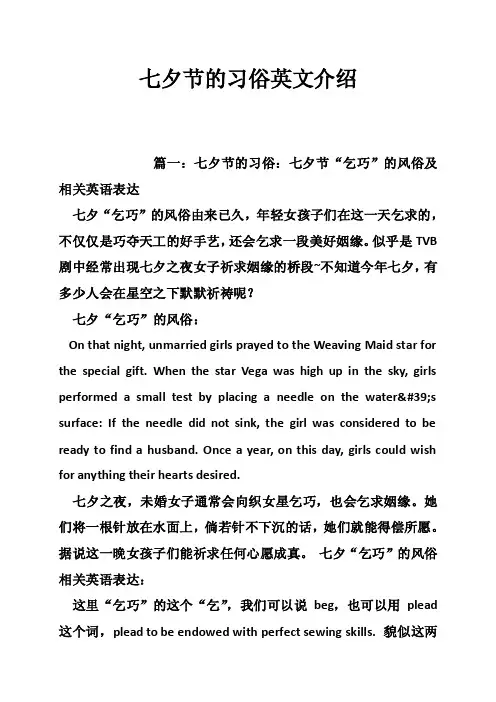
七夕节的习俗英文介绍篇一:七夕节的习俗:七夕节“乞巧”的风俗及相关英语表达七夕“乞巧”的风俗由来已久,年轻女孩子们在这一天乞求的,不仅仅是巧夺天工的好手艺,还会乞求一段美好姻缘。
似乎是TVB 剧中经常出现七夕之夜女子祈求姻缘的桥段~不知道今年七夕,有多少人会在星空之下默默祈祷呢?七夕“乞巧”的风俗:On that night, unmarried girls prayed to the Weaving Maid star for the special gift. When the star Vega was high up in the sky, girls performed a small test by placing a needle on the water's surface: If the needle did not sink, the girl was considered to be ready to find a husband. Once a year, on this day, girls could wish for anything their hearts desired.七夕之夜,未婚女子通常会向织女星乞巧,也会乞求姻缘。
她们将一根针放在水面上,倘若针不下沉的话,她们就能得偿所愿。
据说这一晚女孩子们能祈求任何心愿成真。
七夕“乞巧”的风俗相关英语表达:这里“乞巧”的这个“乞”,我们可以说beg,也可以用plead 这个词,plead to be endowed with perfect sewing skills. 貌似这两个词都和浪漫气氛不符哦,plead其实更常见于法庭上,律师为某人辩护,就是plead one's case;而那句我们耳熟能详的“不认罪”,则是plead not guilty,反之“认罪”就是plead guilty——注意这里的用法,比较特殊哦,是在动词plead后面直接加形容词guilty——法官就会经常问这句话:Do you plead guilty or not guilty?你可认罪?(好有包大人的风范啊~)也有一个更常见的情况,就是被告人plead insanity,以精神失常为借口,试图减轻刑罚。
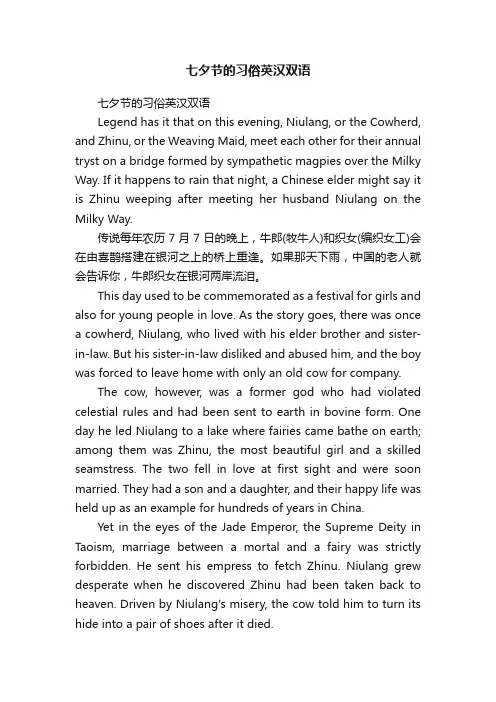
七夕节的习俗英汉双语七夕节的习俗英汉双语Legend has it that on this evening, Niulang, or the Cowherd, and Zhinu, or the Weaving Maid, meet each other for their annual tryst on a bridge formed by sympathetic magpies over the Milky Way. If it happens to rain that night, a Chinese elder might say it is Zhinu weeping after meeting her husband Niulang on the Milky Way.传说每年农历7月7日的晚上,牛郎(牧牛人)和织女(编织女工)会在由喜鹊搭建在银河之上的桥上重逢。
如果那天下雨,中国的老人就会告诉你,牛郎织女在银河两岸流泪。
This day used to be commemorated as a festival for girls and also for young people in love. As the story goes, there was once a cowherd, Niulang, who lived with his elder brother and sister-in-law. But his sister-in-law disliked and abused him, and the boy was forced to leave home with only an old cow for company.The cow, however, was a former god who had violated celestial rules and had been sent to earth in bovine form. One day he led Niulang to a lake where fairies came bathe on earth; among them was Zhinu, the most beautiful girl and a skilled seamstress. The two fell in love at first sight and were soon married. They had a son and a daughter, and their happy life was held up as an example for hundreds of years in China.Yet in the eyes of the Jade Emperor, the Supreme Deity in Taoism, marriage between a mortal and a fairy was strictly forbidden. He sent his empress to fetch Zhinu. Niulang grew desperate when he discovered Zhinu had been taken back to heaven. Driven by Niulang's misery, the cow told him to turn its hide into a pair of shoes after it died.The magic shoes whisked off Niulang, who carried his two children in baskets strung from a shoulder pole, off on a chase after the empress. The pursuit enraged the empress, who took her hairpin and slashed it across the sky, creating the Milky Way which separated husband from wife. But all was not lost. An army of magpies, moved by their love and devotion, formed a bridge across the Milky Way to reunite the family. Even the Jade Empero r was touched and allowed Niulang and Zhinu to meet once a year on the seventh night of the seventh month. It is said that at that night, children can hear the private conversation between the Weaving Maid and the Cowherd under the grape trellis. This is how Qixi came to be.In actuality, the festival can be traced back to the Han Dynasty (206 BC-AD 220). People would traditionally look up at the sky and spot a bright star in the constellation Aquila, as well as the star Vega, identified as Niulang and Zhinu. The two stars shine on opposite sides of the Milky Way.Qixi is also known as the "Begging for Skills Festival" or "Daughters' Festival." In the past, girls would hold ceremonies on the day and pray to Zhinu for wisdom, dexterity and a satisfying marriage. In some parts of Shandong Province, young women would offer fruit and pastries to her in return for a blessing of intelligence. If spiders were seen to weave webs on sacrificial objects, it was believed that Zhinu was offering positive feedback. In other parts of China, the custom was for seven close friends to gather to make dumplings. They would put into three separate dumplings a needle, a copper coin and a red date, which represented perfect needlework skills, good fortune and an early marriage respectively.Young women in southern China wove small handicrafts withcolored paper, grass and thread. Weaving and needlework competitions would be held to see who had the best hands and the brightest mind, prerequisites for being a good wife and mother.However, these ancient traditions and customs have been slowly dying out. Fewer people than ever gaze at the heaven on that day to pick out the two stars shining bright on either side of the Milky Way -- that is, if they even know on which day Qixi falls.七夕坐看牵牛织女星,是民间的习俗,相传,在每年的这个夜晚,是天上织女与牛郎在鹊桥相会之时。
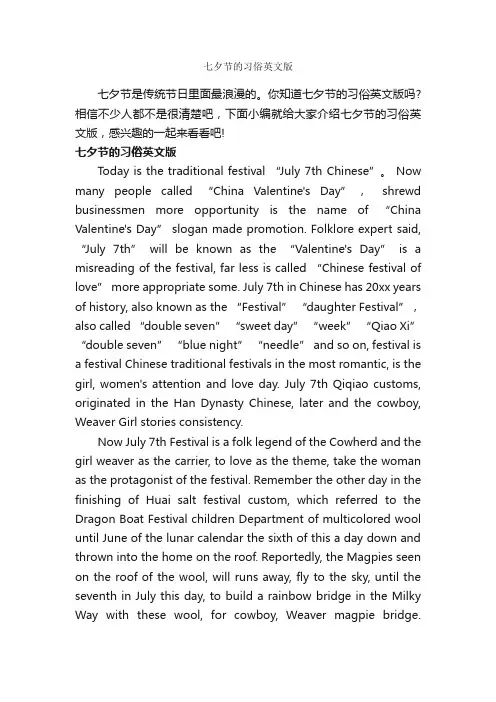
七夕节的习俗英文版七夕节是传统节日里面最浪漫的。
你知道七夕节的习俗英文版吗?相信不少人都不是很清楚吧,下面小编就给大家介绍七夕节的习俗英文版,感兴趣的一起来看看吧!七夕节的习俗英文版Today is the traditional festival “July 7th Chinese”。
Now many people called “China Valentine's Day”,shrewd businessmen more opportunity is the name of “China Valentine's Day” slogan made promotion. Folklore expert said, “July 7th” will be known as the “Valentine's Day” is a misreading of the festival, far less is called “Chinese festival of love” more appropriate some. July 7th in Chinese has 20xx years of history, also known as the “Festival” “daughter Festival”,also called “double seven” “sweet day” “week” “Qiao Xi” “double seven” “blue night” “needle” a nd so on, festival is a festival Chinese traditional festivals in the most romantic, is the girl, women's attention and love day. July 7th Qiqiao customs, originated in the Han Dynasty Chinese, later and the cowboy, Weaver Girl stories consistency.Now July 7th Festival is a folk legend of the Cowherd and the girl weaver as the carrier, to love as the theme, take the woman as the protagonist of the festival. Remember the other day in the finishing of Huai salt festival custom, which referred to the Dragon Boat Festival children Department of multicolored wool until June of the lunar calendar the sixth of this a day down and thrown into the home on the roof. Reportedly, the Magpies seen on the roof of the wool, will runs away, fly to the sky, until the seventh in July this day, to build a rainbow bridge in the Milky Way with these wool, for cowboy, Weaver magpie bridge.People's imagination is really rich, through the tunnel of time and space, first with the cowherd fairies a peerless immeasurably vast difference of love, then is the huge resistance to separate their students. But the common people heart is always full of infinite hope, even in the face of the most complete darkness situation, so there will be a “July 7th” the Cowherd and the girl weaver reunion. The Double Seventh Festival also contains sing feelings stable family and significance of labor quality praise ingenuity.Childhood saw Huangmei play “the Cowherd and the girl weaver”, in which the picture until now still linger in the mind. During the festival the harvest scene is still vivid in my mind. The harvest of fruits and vegetables, and the peaceful village near and the weaver even once bullied cowboy's sister-in-law shame the rattle of a handshake, the scene is really touching. Vega and cowherd use industrious hands the day darn so sweet, when heard Vega with soft sweet voice sing contentment, young I although not all understand, but the hearts are from the branded with the peaceful picture, and become the hearts of the most beautiful dream.More of those big sisters teased me, Tanabata night to take me to hide in the frame under eavesdropping the Cowherd and the Girl Weaver said quietly, have little I always Baba and behind them. But unfortunately, I always whisper before they will enter the sweet dreams in the Cowherd and the Weaver said, when you wake up, petty sister always told you put in the heart, no one told me, so until now, I don't know what that they overheard. Thus, the beautiful country, the mysterious night then condenses into a misty moving silhouettes of childhood. This was the Tanabata, when I was in the network, in the newspapers see everywhere of double seventh article, the feeling of my heart is joy. Becauseonce upon a time, many traditional festival custom is changes with the times and gradually out of people's vision, and many foreign foreign festival has come to. In 20xx, “Tanabata” was included in the first batch of national intangible cultural heritage list, so more and more people, especially young people know and underst and the cultural connotation of the festival. “Tanabata”,she is not Valentine's day, but should be the festival of love. In this love fast-food era, let this break through traditional Chinese virtues of love festival awaken that the pure and beautiful feeling! 七夕节简介七夕情人节,又名乞巧节、七巧节或七姐诞,始于汉朝,是流行于中国及汉字文化圈诸国的传统文化节日,相传农历七月七日夜或七月六日夜妇女在庭院向织女星乞求智巧,故称为“乞巧”。
七夕节习俗变化的英语作文英文回答:The Qixi Festival, also known as the Double Seventh Festival, is a traditional Chinese festival that celebrates the love story between the cowherd, Niulang, and the weaver girl, Zhinü. The festival falls on the seventh day of the seventh month of the lunar calendar, which usually occurs in August or September.In ancient times, the Qixi Festival was a day for young women to pray for a good husband. They would make offerings to Zhinü, the goddess of weaving, and ask her to grant them a happy marriage. The festival was also a time for young couples to celebrate their love. They would exchange gifts and vows, and spend time together.Over the years, the Qixi Festival has evolved and changed. While it is still a day to celebrate love, it has become more commercialized in recent years. Many people nowview the festival as an opportunity to buy gifts for their loved ones or go out for a romantic dinner.Despite the changes, the Qixi Festival remains a popular holiday in China. It is a day for people to celebrate love and relationships, and to remember the beautiful story of Niulang and Zhinü.Here are some of the traditional customs associated with the Qixi Festival:Praying to Zhinü: Young women would make offerings to Zhinü and ask he r to grant them a good husband.Exchanging gifts: Couples would exchange gifts, such as jewelry, clothes, or flowers.Spending time together: Couples would spend time together, talking, laughing, and enjoying each other's company.Eating sweet treats: People would eat sweet treats,such as mooncakes and dumplings, to symbolize the sweetness of love.Watching the stars: People would watch the stars in the night sky, and look for the stars that represent Niulang and Zhinü.中文回答:七夕节,又称双七节,是中国传统节日,庆祝牛郎织女的爱情故事。
七夕用英语怎么说,七夕节的习俗英文每到农历七月初七,相传牛郎织女鹊桥相会的日子,姑娘们就会来到花前月下,抬头仰望星空,寻找银河两边的牛郎星和织女星,希望能看到他们一年一度的相会,乞求上天能让自己能象织女那样心灵手巧,祈祷自己能有如意称心的美满婚姻,由此形成了七夕节,又名爱情节。
下面是学习啦小编为大家收集关于七夕用英语怎么说,欢迎借鉴参考。
七夕节英文:Tanabata Festival; Double Seventh Festival; Double Seventh Day; Chinese Valentine's Day七夕情人节指的是农历七月的第七个夜晚,这个节日是汉代传统的民间节日。
七夕的晚上不仅仅是传说中的"牛郎"和"织女"一年一度相会的夜晚,同时也是为编制姑娘们祈求心灵手巧的好机会。
因此,七夕节又叫"乞巧节","女儿节"。
尽管七夕节不如其它节日那般流行,但是在中国,男女老少都对节日背后的故事相当熟悉。
The Double Seventh Festival refers to the seventh night of the seventh lunar month. It is a traditional folk festival of the Han people. This night is not only the time when the legendary Cowherd and the Girl Weaver are supposed to have their annual meeting, but also a good opportunity for women to pray for the Girl Weaver for the purpose of seeking dexterity. Therefore, this festival is also named " Maiden's Day", " Daughter's Day". The day is not as well-known as many other Chinese festivals. But almost everyone in China, young or old, is very familiar with the story behind it.七夕节的习俗英文1、For her种生求子The old customs, in the days before the July 7th, first in a small wooden deposited a layer of soil, planting corn seeds, let it give birthto the green plants, put some small cottage, Kaki in the above, a small village farmhouse people look, known as the "shell", or mung bean, adzuki beans, wheat, immersed in the magnetic bowl, wait for it to grow enough inch bud, then to red, blue wire rope tied into a bundle, called "seed", also called "five bowl" or "flower pot".旧时习俗,在七夕前几天,先在小木板上敷一层土,播下粟米的种子,让它生出绿油油的嫩苗,再摆一些小茅屋、花木在上面,做成田舍人家小村落的模样,称为“壳板”,或将绿豆、小豆、小麦等浸于磁碗中,等它长出敷寸的芽,再以红、蓝丝绳扎成一束,称为“种生”,又叫“五生盆”或“生花盆”。
七夕节习俗英文介绍七夕节有很多习俗,你知道七夕节习俗英文怎样说吗?相信不少人都不是很清楚吧,下面小编就给大家介绍七夕节习俗英文版,感兴趣的一起来看看吧!七夕节习俗英文介绍QiQiao needleThis is the earliest QiQiao mode, and later began in han deteriorates. The fissura miscellanea, said: "the Chinese female often in July 7 colour in seven holes, people look to needle with learning." By age LiangZongMou jingchu, said: "the July 7, Pennsylvania is somebody else women wear seven self-expanding floor with gold and silver, or stone for yourself." "And", said: "all topographic exerts on July 7th layer, city of more than GongRen, put a needle. The needle floor." The five WangRenYu YiShi tianbao kaiyuan Tanabata, "said: by jin palace building, forming a hundred yards, high house can be overcome with dozens of people, Chen, fruit wine, with ZuoJu char sacrificial cow female star in nine holes, concubines to wear colors on needle thread for ever, skillfully. Move the hou qing of song, pleasures of people working. Soil is of validity. The correlations TaoZongYi yuan YuanShi records of court said: "the nine lead, QiQiao Tanabata. And, with colorful silk wear lady-in-waiting debut at first, for after finish, who was later lost the contributive to exchange, each person should be."喜蛛应巧这也是较早的一种乞巧方式,其俗稍晚于穿针乞巧,大致起于南北朝之时。
七夕用英语怎么说,七夕节的习俗英文每到农历七月初七,相传牛郎织女鹊桥相会的日子,姑娘们就会来到花前月下,抬头仰望星空,寻找银河两边的牛郎星和织女星,希望能看到他们一年一度的相会,乞求上天能让自己能象织女那样心灵手巧,祈祷自己能有如意称心的美满婚姻,由此形成了七夕节,又名爱情节。
下面是学习啦小编为大家收集关于七夕用英语怎么说,欢迎借鉴参考。
七夕节英文:Tanabata Festival; Double Seventh Festival; Double Seventh Day; Chinese Valentine's Day七夕情人节指的是农历七月的第七个夜晚,这个节日是汉代传统的民间节日。
七夕的晚上不仅仅是传说中的"牛郎"和"织女"一年一度相会的夜晚,同时也是为编制姑娘们祈求心灵手巧的好机会。
因此,七夕节又叫"乞巧节","女儿节"。
尽管七夕节不如其它节日那般流行,但是在中国,男女老少都对节日背后的故事相当熟悉。
The Double Seventh Festival refers to the seventh night of the seventh lunar month. It is a traditional folk festival of the Han people. This night is not only the time when the legendary Cowherd and the Girl Weaver are supposed to have their annual meeting, but also a good opportunity for women to pray for the Girl Weaver for the purpose of seeking dexterity. Therefore, this festival is also named " Maiden's Day", " Daughter's Day". The day is not as well-known as many other Chinese festivals. But almost everyone in China, young or old, is very familiar with the story behind it.七夕节的习俗英文1、For her种生求子The old customs, in the days before the July 7th, first in a small wooden deposited a layer of soil, planting corn seeds, let it give birth to the green plants, put some small cottage, Kaki in the above, a small village farmhouse people look, known as the "shell", or mung bean, adzuki beans, wheat, immersed in the magnetic bowl, wait for it to grow enough inch bud, then to red, blue wire rope tied into a bundle, called "seed", also called "five bowl" or "flower pot".旧时习俗,在七夕前几天,先在小木板上敷一层土,播下粟米的种子,让它生出绿油油的嫩苗,再摆一些小茅屋、花木在上面,做成田舍人家小村落的模样,称为“壳板”,或将绿豆、小豆、小麦等浸于磁碗中,等它长出敷寸的芽,再以红、蓝丝绳扎成一束,称为“种生”,又叫“五生盆”或“生花盆”。
七夕节的习俗用英文怎么说眼看七夕情人节就到来了,七夕情人节是来源于牛郎织女美丽的爱情故事,你知道七夕节的习俗用英文怎么说吗?下面店铺就告诉你七夕节的习俗英文版,一起看看吧!七夕节的习俗英文版The Tanabata festival ", and "girl," "sections. Chinese traditional festival is one of the most romantic festival, is also in the day. On this night, women wear QiQiao needle, praying f lu shou activities, display various furniture, appliances are smal 七夕节又称“少女节”,、“女儿节”。
是中国传统节日中最具浪漫色彩的一个节日,也是过去姑娘们最为重视的日子。
在这一天晚上,妇女们穿针乞巧,祈祷福禄寿活动,陈列各式家具、用具都精美小巧、惹人喜爱。
七夕过法最欢乐:游乐园纵情欢乐?假如你喜欢的人不比较爱玩,或是你们刚开始交往不久,那么可以去游乐园玩,是你的最佳选择。
七夕期间,各地公园、游乐园都推出许多情侣优惠活动,和情侣互动的游戏。
不仅可以增加彼此的了解,还可以放松心情,释放压力。
临走的时候,再颁发一个“最佳女友(男友)证”,她(他)一定会激动万分。
最温馨:在家自制烛光晚餐如果你没有时间或条件去山顶数星星、去海边放烟火,那么在家中准备一场烛光晚餐也是不错的选择。
为心爱的人做饭是一种幸福,尤其在这样一个浪漫的夜晚。
尽管你在厨房忙得焦头烂额、手忙脚乱,但当他打开房门的那一瞬间惊喜的表情,便会让你觉得什么都值得。
饭桌上不需要山珍海味、美味珍馐,只需把盏夜光杯、烛火摇曳,情人间的小调调已经十足。
最大众:一起逛商场看电影七夕不是国家法定节日,大部分人都要工作,因此下了班后相约商业中心,一起共进晚餐,然后去逛商场、看一场电影,将会是最大众也是最实用的选择。
竭诚为您提供优质文档/双击可除
七夕节的习俗英语
篇一:七夕节的习俗:七夕节“乞巧”的风俗及相关英语表达
七夕“乞巧”的风俗由来已久,年轻女孩子们在这一天乞求的,不仅仅是巧夺天工的好手艺,还会乞求一段美好姻缘。
似乎是TVb剧中经常出现七夕之夜女子祈求姻缘的桥段~不知道今年七夕,有多少人会在星空之下默默祈祷呢?
七夕“乞巧”的风俗:
onthatnight,unmarriedgirlsprayedtotheweavingmaidsta rforthespecialgift.whenthestarVegawashighupinthesky ,girlsperformedasmalltestbyplacinganeedleonthewater ssurface:Iftheneedledidnotsink,thegirlwasconsidered tobereadytofindahusband.onceayear,onthisday,girlsco uldwishforanythingtheirheartsdesired.
七夕之夜,未婚女子通常会向织女星乞巧,也会乞求姻缘。
她们将一根针放在水面上,倘若针不下沉的话,她们就能得偿所愿。
据说这一晚女孩子们能祈求任何心愿成真。
七夕“乞巧”的风俗相关英语表达:
这里“乞巧”的这个“乞”,我们可以说beg,也可以用plead这个词,pleadtobeendowedwithperfectsewingskills.貌似这两个词都和浪漫气氛不符哦,plead其实更常见于法
庭上,律师为某人辩护,就是pleadonescase;而那句我们
耳熟能详的“不认罪”,则是pleadnotguilty,反之“认罪”就是pleadguilty——注意这里的用法,比较特殊哦,是在
动词plead后面直接加形容词guilty——法官就会经常问这句话:Doyoupleadguiltyornotguilty?你可认罪?(好有
包大人的风范啊~)
也有一个更常见的情况,就是被告人pleadinsanity,
以精神失常为借口,试图减轻刑罚。
回到七夕乞巧的风俗吧,乞巧是为了精进自己的女红手艺,女红(注意啊注意啊,这里的“红”读音是“工”,不要读错了哦)也就是针线活,
用英语说就是doingneedlework。
印象中女红活儿就是刺绣(embroider)吧,不知道现在还有多少女孩子会刺绣活儿呢?似乎大家都更prefer简单易学的十字绣(cross-stitch)了。
那么,学十字绣的话,也是需要乞一下巧的吧……
至于祈求姻缘,这个恐怕还是要看缘分哦,如果两个人
是predestinedtobetogether,那么是无论如何都会相遇并相爱的吧。
在这里祝天下有情人终成眷属吧!(Allshallbewell,andJackshallhaveJill!)
篇二:与中国情人节“七夕”有关的风俗与英文
七夕“乞巧”的风俗由来已久,年轻女孩子们在这一天乞求的,不仅仅是巧夺天工的好手艺,还会乞求一段美好姻缘。
似乎是TVb剧中经常出现七夕之夜女子祈求姻缘的桥段~不知道今年七夕,有多少人会在星空之下默默祈祷呢?
七夕“乞巧”的风俗:
onthatnight,unmarriedgirlsprayedtotheweavingmaidsta rforthespecialgift.whenthestarVegawashighupinthesky ,girlsperformedasmalltestbyplacinganeedleonthewater ssurface:Iftheneedledidnotsink,thegirlwasconsidered tobereadytofindahusband.onceayear,onthisday,girlsco uldwishforanythingtheirheartsdesired.
七夕之夜,未婚女子通常会向织女星乞巧,也会乞求姻缘。
她们将一根针放在水面上,倘若针不下沉的话,她们就能得偿所愿。
据说这一晚女孩子们能祈求任何心愿成真。
七夕“乞巧”的风俗相关英语表达:
这里“乞巧”的这个“乞”,我们可以说beg,也可以用plead这个词,pleadtobeendowedwithperfectsewingskills.。